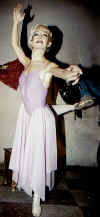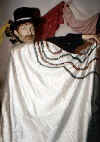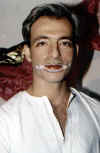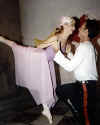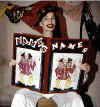|
by Dwaine Steffes |
|
Directed by Makki
Marseilles
Company Manager :
Tony Walters
Puppets by Spyros
Papachristou
Music by Stewart
Carolan
Set painted by Markos
Halaris
Poster designed by
Dimitris Kandopoulos
Produced by John
Floras
First performance : 24
Jan. 1988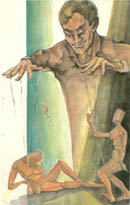 The touch of a girl from the
audience gives Pulcinello, a wooden puppet, the impression
that he is... real! The feeling leads him to question his dependence on the
master who manipulates the strings of
the puppets, and awakens in him the desire for freedom. He attempts to
escape from the trunk with interesting results...
"I believe in
the immoral soul of marionettes and dolls. Doubtless there is nothing
human in the way of the flesh in these beings of wood or cardboard; but
there is in them something of the divine, however little it may be."
(Anatole France) |
|
The History of
Puppetry
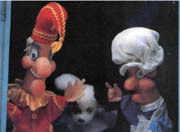 Some people claim that puppetry was practised in
India as long as 4.000 years ago
citing as supporting evidence that the leading player in
Sanscrit plays is titled "Sutradhara" meaning the holder of
strings. Others claim it all started in China about 2,000
years ago. There is evidence that marionettes, and possibly
shadow puppets were in use in China as early as 8 AD. Puppets
were used in Greece as early as 800 BC and they were established as a
common form of entertainment as early as 400 BC. Some people claim that puppetry was practised in
India as long as 4.000 years ago
citing as supporting evidence that the leading player in
Sanscrit plays is titled "Sutradhara" meaning the holder of
strings. Others claim it all started in China about 2,000
years ago. There is evidence that marionettes, and possibly
shadow puppets were in use in China as early as 8 AD. Puppets
were used in Greece as early as 800 BC and they were established as a
common form of entertainment as early as 400 BC.
The Greek word for
marionette is "neurospaston" -
"neuron" meaning cord. Glove puppets may also have been used -
"koree" is a long sleeve
that covers the hand and a small statue.
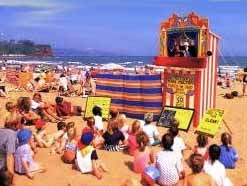 The first puppeteer known by name is Potheinos - who performed in the
Dionysus theatre under the Acropolis, in Athens much to the
annoyance of the sophists. Xenophon in his symposium mentions
performances given by travelling
puppet players from Syracuse. In all the early Mediterranean
civilizations, and during the Roman Empire puppet drama
flourished. It is believed the characters of theComedia del' Arte owe something to them. In the
Middle Ages wandering puppet showmen travelled all over Europe
with their puppet shows. Puppets were also widely used to
enact the scriptures until they were banned by the
Church. The first puppeteer known by name is Potheinos - who performed in the
Dionysus theatre under the Acropolis, in Athens much to the
annoyance of the sophists. Xenophon in his symposium mentions
performances given by travelling
puppet players from Syracuse. In all the early Mediterranean
civilizations, and during the Roman Empire puppet drama
flourished. It is believed the characters of theComedia del' Arte owe something to them. In the
Middle Ages wandering puppet showmen travelled all over Europe
with their puppet shows. Puppets were also widely used to
enact the scriptures until they were banned by the
Church.
Shadow puppetry
is very popular in Greece nowadays featuring Karagiozis - a Punch like character,
with Spatharis one of the greatest
exponents of the art of puppetry. His father and grandfather
were also puppetteers and he himself has established a museum in
the Maroussi area.
The Players
|

Mark Jowett
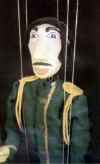
General Vallardi |

Ian Kearns
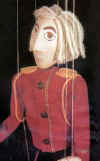
Captain
Pulcinello |

Pat Brackensbury
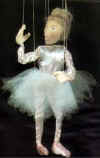
Judina (a dancer)
|

Helen Pavli
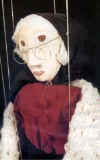
Nicollini (seamstress)
|

Louise Hagen
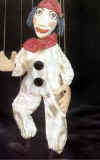
Nameless (a
clown) | |



|







 Some people claim that puppetry was practised in
Ind
Some people claim that puppetry was practised in
Ind The first
The first 





